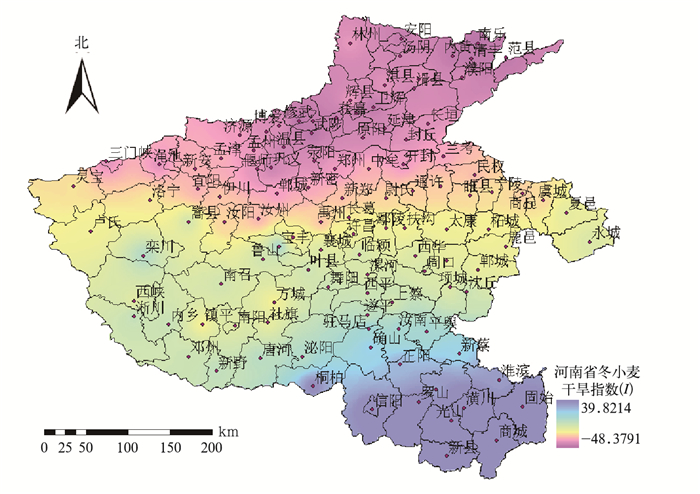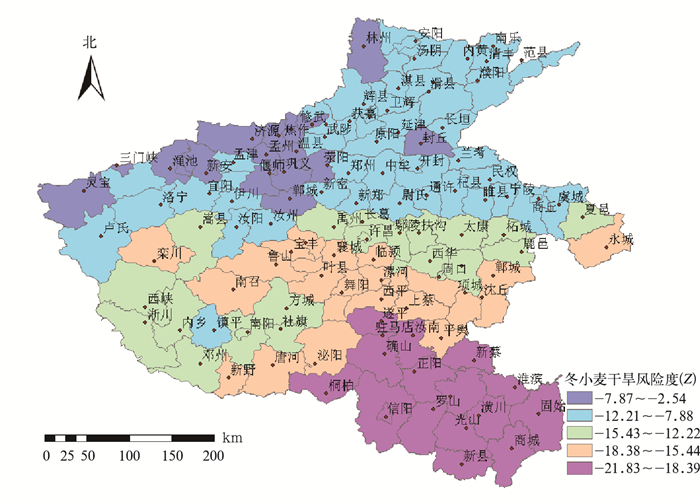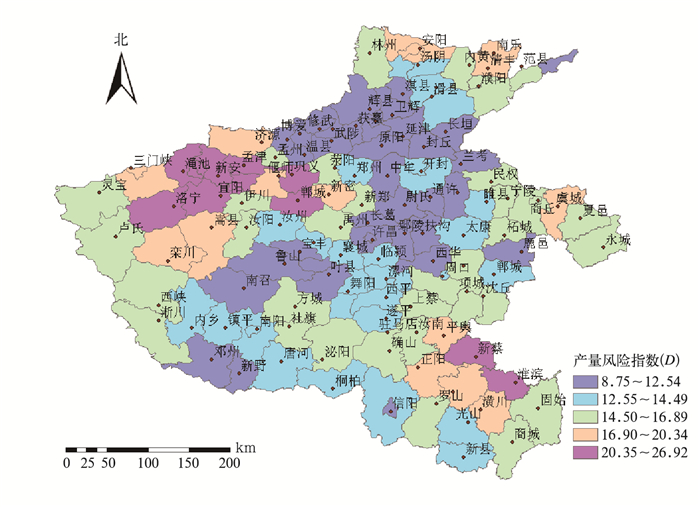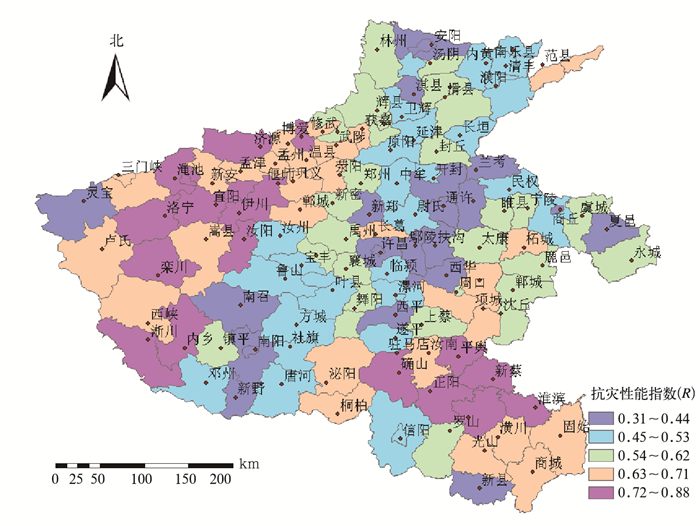Winter Wheat Drought Disaster Insurance Risk Assessment and Regionalization in Henan Province
-
摘要: 以河南省冬小麦干旱为例,探讨了农业气象灾害保险风险评估与区划方法。首先,在构建冬小麦不同生育期干旱指数的基础上,结合农业保险的特征和精细化、专业化的需求,从气象因子、作物产量以及社会经济水平的角度选用干旱风险度、易损性指数、产量风险指数、抗灾性能指数4个指标对致灾因子、承灾体易损性、灾损风险、防灾减灾能力4个方面进行分析和评估。然后将上述4个保险风险评估指标细化到县级,采用聚类分析方法,对河南省冬小麦干旱进行了气象指数保险风险区划和政策性保险风险区划。两种区划结果表明:除豫西高风险区的个别县互相重合外,其余各县所属风险区有较大差别。因此,针对不同的保险特点和需求,需要采用不同的区划指标和方法,才能推行区域农业保险,更好地实行差别保险费率。Abstract: Through quantifying the hazards and distribution of meteorological disasters which impact on crop growth and final yield, taking the drought of winter wheat in Henan Province as an example, a system methodology of the insurance risk assessment and regionalization of agrometeorological disasters is proposed.Based on the calculation of relative humility index in different growth stages, taking the moisture content coercion sensitive coefficient given by Jensen multiplication model as the weighting factor, winter wheat drought index of entire period is established, while considering the first three months before emergence as the period before sowing, using the precipitation anomalous percentage combined with the contribution factors, the winter wheat drought index of entire period is revised and meanwhile the suitable winter wheat drought index for Henan is established.After that, from the aspects of climatic factors, crop yield and social-economic, and after considering the characteristics of agricultural insurances and their requirements for elaboration, specialization, four indicators are used, including drought risk level, vulnerability index, yield risk index and anti-disaster ability, to evaluate the disastrous factors, vulnerability of crops, hazards of disaster events and ability of disaster prevention and reduction. Among these indexes, considering the social economy level and individual management scale, the vulnerability index is constructed by the winter wheat production efficiency index, production specialized index, and exposed index, which manifests the characteristics of agricultural insurance risk regionalization different from the general insurance risk regionalization.Finally, using these four indexes and cluster analysis method, weather index insurance risk regionalization and policy-related insurance risk regionalization are carried out in winter wheat drought at county level in Henan Province. The risk regionalization results of weather index insurance show that most counties located in the west of Henan belong to high risk areas, the south part of Henan belongs to low risk area, while majority of the other counties belong to medium risk areas. The risk regionalization results of policy-related insurance show that most counties located in the west of Henan belong to high risk areas, counties located in south, middle and north of Henan belong to medium risk areas, while most countries located in the southwest and individual counties located in the middle belong to low risk areas. There are remarkable differences between these two regionalization results, for better regional agricultural insurance and implement differential premium rate, different regionalization indexes and methods are required according to their characteristics and demands.Some quantitative analysis conclusions could be combined with elevation, soil types, knowledge level of peasant, GDP level, the agricultural insurance popularization situation as well as space and time rules of the agrometeorological disasters, further consummating the results of crop insurance risk assessment and regionalization, in order to instruct the peasant to choose the types of insurance more properly and the insurance company to arrange the premium rate more reasonably.
-
表 1 河南省冬小麦不同发育阶段的作物系数和水分胁迫敏感系数
Table 1 Crop coefficients and water stress sensitivity coefficients of winter wheat at different growth stages
发育阶段 作物系数 水分敏感系数 出苗阶段 0.6 0.1721 越冬阶段 0.7 0.0411 返青阶段 0.9 0.0591 拔节阶段 1.1 0.1694 抽穗开花阶段 0.9 0.3108 灌浆成熟阶段 0.9 0.1895 表 2 河南省冬小麦干旱指标
Table 2 Drought index of winter wheat in Henan Province
干旱类型 减产率 (rd)/% 冬小麦干旱指数 (I) 轻旱 5.0≤rd<10.0 -8.15≥I>-18.58 中旱 10.0≤rd<20.0 -18.58≥I>-39.44 重旱 20.0≤rd<30.0 -39.44≥I>-60.29 严重干旱 30.0≤rd<40.0 -60.29≥I>-81.15 极端干旱 rd≥40.0 I≤-81.15 表 3 气象指数保险风险评估因子在不同风险区的统计情况
Table 3 Statistical situation of weather index insurance risk assessment factors in different risk areas
风险等级 干旱风险度 产量风险指数 综合风险指数 高风险区 0.6518 0.6582 0.6550 中高风险区 0.2551 0.7157 0.4854 中等风险区 0.5393 0.2529 0.3961 中低风险区 0.3282 0.2174 0.2728 低风险区 0.0861 0.3283 0.2072 表 4 政策性保险风险评估因子在不同风险区的统计情况
Table 4 Statistics of policy related insurance risk assessment factors in different areas
风险等级 干旱风险度 易损性指数 产量风险指数 抗灾性能指数 综合风险指数 高风险区 0.5993 0.3065 0.4990 0.1828 0.0514 中高风险区 0.5284 0.7686 0.2704 0.3256 0.0397 中等风险区 0.1902 0.2605 0.6355 0.1713 0.0176 中低风险区 0.2717 0.6095 0.3471 0.4141 0.0166 低风险区 0.3822 0.3682 0.1974 0.5427 0.0055 -
[1] 张业成.中国自然灾害综合风险预测与分区减灾对策.地质灾害与环境保护, 1998, 9(1): 1-5. http://www.cnki.com.cn/Article/CJFDTOTAL-DZHB801.000.htm [2] 刘建栋, 王馥棠, 于强, 等.华北地区农业干旱预测模型及其应用研究.应用气象学报, 2003, 14(5): 593-604. http://qikan.camscma.cn/jams/ch/reader/view_abstract.aspx?file_no=20030574&flag=1 [3] 王石立.冬小麦生长模型及其在干旱影响评估中的应用.应用气象学报, 1998, 9(1): 15-22. http://qikan.camscma.cn/jams/ch/reader/view_abstract.aspx?file_no=19980103&flag=1 [4] 赵艳霞, 王馥棠, 裘国旺.冬小麦干旱识别和预测模型研究.应用气象学报, 2001, 12(2): 234-241. http://qikan.camscma.cn/jams/ch/reader/view_abstract.aspx?file_no=20010231&flag=1 [5] 刘丽.自然灾害保险风险分析.自然灾害学报, 2006, 15(1): 87-91. http://www.cnki.com.cn/Article/CJFDTOTAL-ZRZH200601013.htm [6] 周玉淑, 邓国, 齐斌, 等.中国粮食产量保险费率的订定方法和保险费率区划.南京气象学院学报, 2003, 26(6): 807-813. http://www.cnki.com.cn/Article/CJFDTOTAL-NJQX200306011.htm [7] 郭迎春, 闫宜玲, 王春乙, 等.农业自然风险评估及区域农业保险费率的确定方法.应用气象学报, 1998, 9(2): 232-238. http://qikan.camscma.cn/jams/ch/reader/view_abstract.aspx?file_no=19980232&flag=1 [8] 邢鹂, 高涛, 吕开宇, 等.北京市蔬菜作物生产风险区划研究.中国农业资源与区划, 2008, 29(6): 55-60. http://www.cnki.com.cn/Article/CJFDTOTAL-ZGNZ200806016.htm [9] 丁少群, 庹国柱.论农作物保险区划及其理论依据——农作物保险区划研究之一.当代经济科学, 1994(3):64-70. http://www.cnki.com.cn/Article/CJFDTOTAL-DJKX403.011.htm [10] 丁少群, 庹国柱.农作物保险的危险单位区划研究——农作物保险区划研究之二.中国保险管理干部学院学报, 1994(6):24-29. http://www.cnki.com.cn/Article/CJFDTOTAL-DJKX403.011.htm [11] 庹国柱, 丁少群.农作物保险风险分区和费率分区问题的探讨.中国农村经济, 1994, 8: 43-47. http://www.cnki.com.cn/Article/CJFDTOTAL-ZNJJ199408008.htm [12] 刘长标. 农作物区域产量保险的精算研究. 北京: 中国人民大学, 2000. [13] 梁来存.我国粮食作物保险风险区划的实证研究.山西财经大学学报, 2010, 32(1): 65-72. http://www.cnki.com.cn/Article/CJFDTOTAL-SXCJ201001011.htm [14] 李世奎, 霍治国, 王素艳, 等.农业气象灾害风险评估体系及模型研究.自然灾害学报, 2004, 13(1): 78-87. http://www.cnki.com.cn/Article/CJFDTOTAL-ZRZH200401013.htm [15] 安顺清, 刘庚山, 吕厚荃, 等.冬小麦底墒供水特征研究.应用气象学报, 2000, 11(增刊): 119-127. http://kns.cnki.net/KCMS/detail/detail.aspx?filename=yyqx2000s1015&dbname=CJFD&dbcode=CJFQ [16] 陈玉民, 郭国双, 王广兴, 等.中国主要作物需水量与灌溉.北京:水利电力出版社, 1995. [17] 杨艺, 周继良, 吴明作.河南省各地区主要作物生态需水研究.河南科学, 2008, 26(6): 677-680. http://www.cnki.com.cn/Article/CJFDTOTAL-HNKX200806016.htm [18] 肖俊夫, 刘战东, 段爱旺, 等.中国主要农作物分生育期Jensen模型研究.节水灌溉, 2008(7): 1-8. http://www.cnki.com.cn/Article/CJFDTOTAL-JSGU200807003.htm [19] 罗俊杰, 黄高宝.底墒对旱地冬小麦和水分利用效率的影响研究.灌溉排水学报, 2009, 28(3): 1-4. http://www.cnki.com.cn/Article/CJFDTOTAL-GGPS200903028.htm [20] 成林, 刘荣花, 申双和, 等.河南省冬小麦干旱规律分析.气象与环境科学, 2007, 30(4): 3-6. http://www.cnki.com.cn/Article/CJFDTOTAL-HNQX200704000.htm [21] 任义方. 农业气象指数保险方法研究——以河南省冬小麦干旱为例. 北京: 中国气象科学研究院, 2011. [22] 杜鹏, 李世奎, 温福光, 等.珠江三角洲主要热带果树农业气象灾害风险分析.应用气象学报, 1995, 6(增刊): 27-32. http://kns.cnki.net/KCMS/detail/detail.aspx?filename=yyqx5s1.003&dbname=CJFD&dbcode=CJFQ [23] 冯利华.基于信息扩散理论的气象要素风险分析.气象科技, 2000, 28(1): 27-29. http://www.cnki.com.cn/Article/CJFDTOTAL-QXKJ200001003.htm [24] 陈新建, 陶建平.基于风险区划的水稻区域产量保险费率研究.华中农业大学学报, 2008, 76(4): 15-17. http://www.cnki.com.cn/Article/CJFDTOTAL-HZND200804002.htm [25] 薛昌颖, 霍治国, 李世奎, 等.北方冬小麦灾损风险类型的地理分布.应用生态学报, 2005, 16(4): 620-625. http://www.cnki.com.cn/Article/CJFDTOTAL-YYSB200504006.htm -


 设为首页
设为首页 加入收藏
加入收藏



 下载:
下载:






